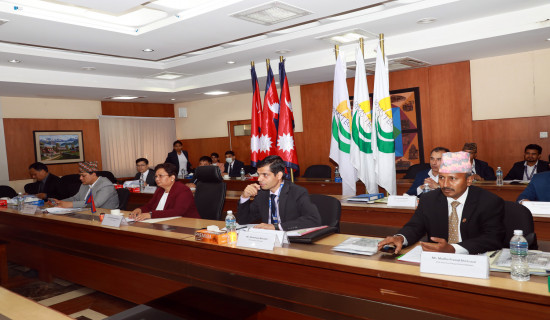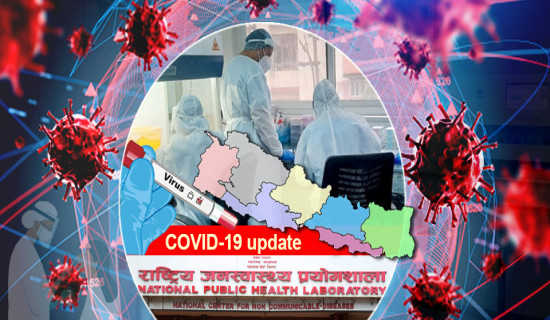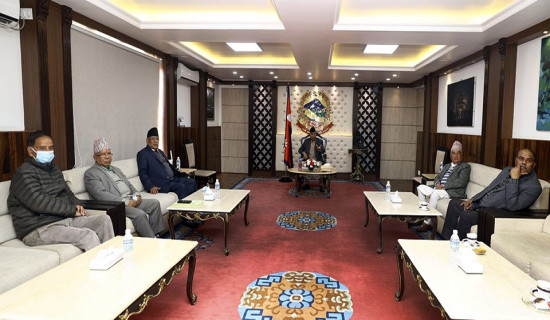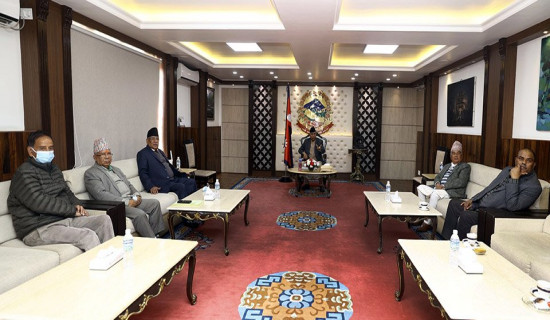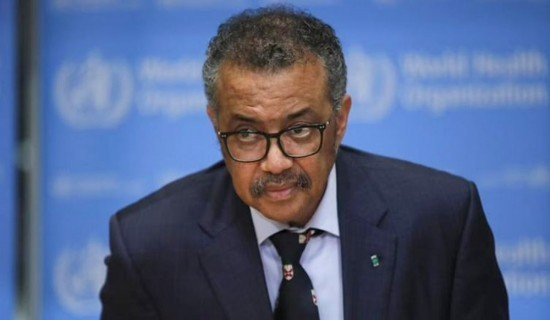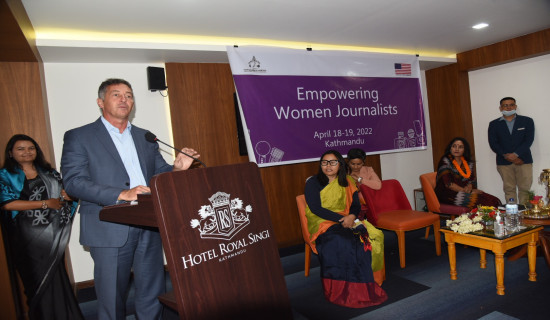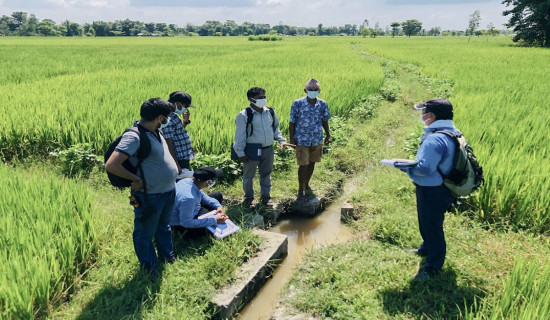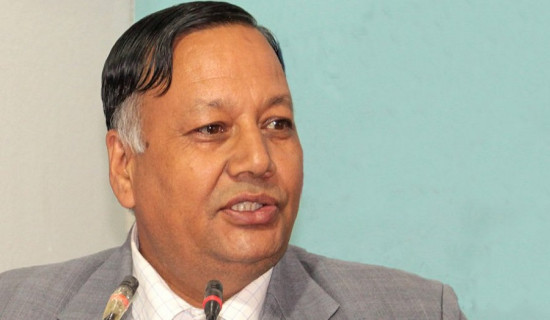- Wednesday, 5 November 2025
Stick To Poll Manifesto
With the date for local elections drawing closer, the political parties have ramped up their campaign to win the support of voters. One way to gain the confidence of the electorates is the issuance of poll manifesto that is a commitment paper of a party made to the public. The manifesto highlights the ideology, policy, programs and action plan of the party that unveils it. The party commits to implementing the promises made in the manifesto if it wins the election and holds the public offices. Theoretically, the manifestoes offer the voters informed decisions before casting their ballots. They come to know about the parties' vision and priorities meant for addressing the burning issues and problems facing the country. Moreover, a poll manifesto serves as the political document for the people to make the given party to accountable to their commitment and action on the ground. The voters accept or reject the parties in the elections on the basis of their performance based on their manifestos. Constitutionally, the parties are not obliged to make public the manifesto but they are morally bound to translate their promises into action. It is a good practice of unveiling the manifesto ahead of polls, which reflects the healthy exercise of democracy. This strengthens the democratic culture, transparency and credibility of the political parties while nurturing their bond with the people. In Nepal, the parties have continued to follow this tradition and canvassed for votes on the basis of their manifestoes. But they are criticised for making tall promises and failing to implement them after the election victory. Nonetheless, the public considers the manifestoes as the yardstick to make informed choices at the ballot boxes. The major and minor parties are set to go to the doorsteps of voters with their manifestoes for the local polls to be held on May 13.The other day, CPN-Unified Socialist, a constituent of the five-party ruling alliance, made public its 47-page election manifesto with the slogan of “People-oriented local government, basis of development and prosperity.” It has rolled out an array of ambitious programmes to bolster social welfare system and good governance as envisaged in the constitution. According to the news report of this daily, the Unified Socialist has put forward the schemes of free drinking water, free health services, reforms in the education system, the protected agricultural market for improving farmers' living standards, developing of road connectivity and other infrastructures, protecting rights of women, children, elderly people, disabled, sexual minorities, Dalits and other minority communities. The party has announced to provide every household with 5,000 liters of clean drinking water in the municipality and 200 units of electricity free of cost through the local government. It has vowed to build well-equipped libraries at the municipal level, chalk out a special plan for the protection of water resources, sort out the problems of landless squatters, create a corruption-free local government and manage the encroached public lands and properties. The party has decided to disclose the property details of its candidates on the day of their nomination for the local level election. The manifesto appears to be impressive but challenges lie in realising it. As the new party, the local poll is a litmus test for it. In order to brighten its poll prospect, it must be able to walk the talk.
Learning From Sri Lankan Crisis
The economic crisis in Sri Lanka has deteriorated rapidly. It has triggered an unprecedented outburst of resentment from the public in Colombo.
Keep Liver Healthy
Vinod C. DixitAs usual, this year’s April 19th was observed as World Liver Day to spread awareness about liver-related diseases. The liver is the second largest and the most complex organ in the body, with the exception of the brain. It is a key player in your body’s digestive system. Everything we eat or drink, including medicine, passes through the liver. It fights infections, regulates blood sugar, removes toxins, controls cholesterol, makes proteins and releases bile to help digestion. We cannot survive without the liver, and it can be easily damaged if we don’t take proper care of it. Liver diseases can be caused by Hepatitis A, B, C, alcohol, and drugs. Viral Hepatitis occurs due to consumption of contaminated food and water, unsafe sexual practices, and drug abuse. Dr. Arvind Sahni, Director, Gastroenterology, Fortis Hospital Mohali, says, “Liver cancer today is the fifth most common cancer claiming millions of lives annually.” However, recent developments in diagnosis and treatment have helped to cure many patients. Remaining vigilant and getting health check-ups done regularly can help in the early detection of liver cancer. A second factor to remember is that liver cancer occurs almost always in diseased livers. It is vital for everyone to get Hepatitis B and C screened regularly and adopt a healthy lifestyle. Alcoholic Liver Disease is a common liver disease. One may catch this ailment after consuming too much alcohol. If you overload your liver by drinking a lot of alcohol, the excess alcohol would end up circulating in your blood. This, in turn, affects our organs like the brain and heart, leading to increased intoxication. Alcohol consumption of more than four drinks (48 g) daily is associated with an increased risk of cirrhosis, liver cancer, and premature death. Alcohol-related liver injury includes acute alcoholic hepatitis, fatty infiltration and cirrhosis. There has been a steady rise in the rate of liver diseases over the years. Globally, alcohol, NASH and viral hepatitis are the most common causes of liver diseases. As per the World Health Organisation’s estimates published in 2017, liver disease deaths in India reached 259, 749 or 2.9 percent of total deaths. Many studies have suggested that sugar-sweetened beverages play a role in the epidemics of obesity, metabolic syndrome and fatty liver disease. It has been known that the fructose component in sugar directly causes abnormalities in the metabolism of sugar and lipids. Indirectly, sugar promotes positive energy balance leading to an increase in body weight and fat content which in turn causes dysregulation of lipid and carbohydrate metabolism.Vitamin A is considered toxic to the liver. Excessive iron from supplements often present in over-the-counter multivitamin preparations can cause iron to accumulate in the liver cells. Presently, there is no cure for a severely diseased liver. Therefore, it is critical to take care of this multi-functionary organ and gland. The only way to manage a failed liver is to get a liver transplant. Let us prevent liver decreases by adopting a healthy lifestyle and maintaining a healthy diet. We should eat foods from all the food groups such as grains, protein, dairy products, fruits, vegetables and fats. Besides, we need to take whole-grain bread, rice and cereals, ensuring safe blood transfusions to avoid contracting Hepatitis A, B and C. Washing hands after going to the bathroom and doing exercise regularly is also necessary for keeping our liver healthy.
Nepal insists on collective commitments for energy security
Kathmandu, Apr. 20 (RSS): Nepal has emphasized that collective commitments were necessary for energy security. During a third meeting of energy ministers from the Bay of Bengal Initiative for Multi-sectoral, Technical and Economic Cooperation (BIMSTEC) here today, Minister for Energy, Water Resources and Irrigation, Pampha Bhusal, highlighted the need for mutual trust, clarity in future endeavors and sincerity in objectives to address the serious issues in the energy sector, bearing in mind the future of 1.7 billion people of BIMSTEC nations. The meeting was assisted by video conferencing technology. Expressing her hope that the meeting would contribute to enhancing mutual energy cooperation among the BIMSTEC nations, the Minister stressed the need for adequate fiscal mobilisation and technology handover to advance toward the path of energy security. She took time to say that increasing inter-relations among the BIMSTEC member states on all fronts would help further promote the spirit and sentiments of regional cooperation. Talking about the Memorandum of Understanding (MoU) for the establishment of the 'BIMSTEC Grid Interconnection' signed at the fourth BIMSTEC Summit held in Kathmandu, the Minister said, "Energy trade is a significant issue and it is capable of addressing the problem of electricity waste and mitigating the risk of energy crisis in the region." "Energy is always the area of priority of BIMSTEC," the Minister said, explaining that relentless efforts were made to promote energy cooperation in the sector. The Minister further stressed the need for mutual cooperation, coordination and facilitation in the energy sector by encouraging the culture of experience sharing, increasing capacity enhancement and promoting best practices. Also addressing the meeting, Ministry Secretary Devendra Karki was of the view of proving the COVID-19 crisis as a take-off for a green, safe and more sustainable Bay of Bengal. " There is opportunity in every crisis." For this, a consolidated and renewable regional partnership in energy would be of importance, he asserted. -
13 new cases, 25 recoveries in last 24 hours
Kathmandu, Apr. 20 (RSS): Thirteen new cases of COVID-19 have been reported in the country in the past 24 hours. This was revealed in a total of 3,877 tests carried out in various laboratories in the country, according to the Ministry of Health and Population.During the same period, 25 more people have recovered. The recovery rate is 98.7 percent.Likewise, no casualty was reported. The death toll remains stagnant for the past few days at 11,951 so far. Also today, 138,182 people were vaccinated against COVID-19. Currently, the number of active cases of COVID-19 is 318, with 314 in home-based isolation and four in institutional isolation, four in ICU and one with the support of ventilator.
Ruling parties finalise seat sharing in metropolis, sub-metropolis for local polls
The ruling parties have finalized a deal on seat-sharing among them in the metropolis and sub-metropolis across the country.
Ruling coalition's meeting underway at Baluwar
The meeting of the ruling coalition is expected to finalise the electoral coordination for the upcoming local level elections in six metropolitan cities and 11 sub-metropolitan cities.
WHO Director-General arriving in Nepal on Thursday
The Director-General is scheduled to land here at 12:15 pm tomorrow. During his stay here, he will pay a courtesy call on President Bidya Devi Bhandari.
Weaker yen, costly oil push Japan’s trade deficit higher
Preliminary data for the fiscal year that ended in March showed exports jumped almost 24% but were outpaced by imports, which climbed 33%. The fiscal year deficit of 5.4 trillion yen (nearly $42 billion) was the highest in seven years.
Proportional representation helps society to advance: Ambassador Berry
By A Staff Reporter, Kathmandu, Apr. 20: US Ambassador to Nepal Randy Berry said that no society can advance to its full potential without proportional representation from all sectors.Addressing a mentoring programme on Monday, entitled “Empowering Women Journalists” organised by the Sancharika Samuha with support from the US Embassy, Berry said adequate representation in media could also support it to raise the issues of all sectors.“Such type of programme can be supportive to empower and increase women participation in media,” Ambassador Berry said.The US ambassador to Nepal further urged the media to reveal wrongdoings and abuse of power that will help strengthen democracy. “Journalism must be curious, fair and balanced for the betterment of society,” he said.Journalists must know the code of ethics to produce balanced news so the truth is never distorted, he highlighted.About 20 women journalists from across the country received women leadership training on Monday and Tuesday. And from these participants some selected will get three-month long mentorship for better story writing, Basanti Bastola, general secretary of the Sancharika Samuha, informed. Senior journalists Harikala Adhikary, Mohan Mainali and Yasodha Timilsina will do mentoring over those participants.
Japan seeks to extend technical cooperation programme for 2022
By TRN Online, Kathmandu, Apr. 20: The Embassy of Japan in Nepal issued a Note Verbale to the Ministry of Foreign Affairs of Nepal to extend the Technical Cooperation Programmes for Fiscal Year 2022.The technical corporation programs, which have been extended to Nepal annually since 2003, have been supporting Nepali governmental officials to obtain Japan’s knowledge, technology and experience by providing them training opportunities in Japan and by sending Japanese advisors to the Nepali government for Nepal’s socio-economic development, said the Japanese embassy in its press release issued today.Technical Cooperation Programs for FY 2022 will be implemented by JICA (Japan International Cooperation Agency) in various fields: namely, more than 50 training courses for medical/health care, governance, private sector development, water supply management, road maintenance, agriculture, education, disaster prevention, climate change, urban transportation and airport development. In addition, eight experts who work as advisors in the Nepali government organizations will be dispatched. The Programs will be beneficial for the further development of Nepali society and the prosperity of the Nepali people, read the press release."The Technical Cooperation Programs for FY2022 include the public health improvement project to prevent infectious diseases, such as the COVID-19 and the project to strengthen resilience to the natural disasters, such as floods that hit Nepal every year. The agricultural sector, in which approximately two-thirds of the population is engaged in, the “Project for the Promotion of Irrigated Agriculture in Terai Plain” and “Strengthening Seed Production, Supply and Quality Control System Project” is set to improve crop yield and its quality". We believe that the technical cooperation programs of the Japanese Government will assist the human resource development of the Government of Nepal for Nepal’s future and support the socio-economic recovery from the COVID-19 pandemic. We hope that they contribute to building stronger bilateral relations between Nepal and Japan to a further extent, the Japanese embassy in Nepal said.
US Congress delegation paying three-day visit to Nepal
According to the Nepali Embassy in Washington DC, the parliamentary team will visit Nepal from upcoming April 22 to 24. The visit is taking place on the eve of the 75th anniversary of the establishment of Nepal-US diplomatic ties.
View-tower and assembly hall construction will be discontinued: Minister Jhankri
Kathmandu, Apr. 20: Minister for Urban Development Ram Kumari Jhankri has said there will be no programmes relating to the construction of the view tower and meeting hall in the government policy and programme for the upcoming fiscal year. The Minister said there would be no budget to construct view -towers and meeting halls next fiscal year as a modality of operation of such structures was missing and it would cause unlimited responsibility on the part of the government, contributing nothing to the improvement of people's livelihood. The Minister, however, insisted on completing the ongoing projects relating to the construction of 32 meeting halls with priority. Besides, as the Minister said, the government will replace the integrated settlement development programme with a new programme for settlement development. " The integrated settlement development programme has turned ineffective in hilly and mountainous areas. And in the case of the Kathmandu Valley and the Terai, land crisis is the issue for its implementation."
University responsible to improve higher education: Education Minister
Karnali, April 20 : Minister for Education, Science and Technology Devendra Poudel has said university is responsible for improving higher education. Universities should produce competent human resources required for the prosperity of country, he stressed. Minister Poudel said it during the second convocation ceremony of Madhyapaschim University in Surkhet on Monday. He shared the information that he was leading the reform in three fronts of education system- legal/policy, teaching and learning, and physical infrastructures. According to him, a 55-point roadmap was launched for the reform in secondary, higher education and technical and vocational education. "These three sorts of education would be improved to meet international standard," he said, arguing that entire educational restructuring was mulled for quality enhancement. Moreover, the Minister informed that drafts of the acts to manage technical education and institutions, federal education and higher education were also readied by the government. It is time to link education to skill and skill to employment, he viewed. The government, as he said, had initiated process to establish medical college in each province. In the convocation ceremony, Nobel Laureate and activist against child labour, Kailash Satyarthi argued education is the major foundation of development.
Rainfall brings relief to farmers
Mahottari, April 20 : The scorching heat in the first week of New Year had afflicted people much. To this, the rainfall occurred last night became a huge relief. The rainfall not only contributed to decrease heat but also made it favourable atmosphere for farmers to till the land. They are happy to till the cultivable land int he wake of rains. Bindeshwor Yadav from Manahari of Bardibas-7 said they would now begin sowing corn, and millet and planting rice. He further said rain removed the dryness. "It encourages us to till land for summer crops," he added. Earlier, the storm had damaged the fragile plants and vegetables in the district. Chauthi Sardar Bantar from Bhangaha-4 said the storm damaged the litchi and mango trees which had just begun yielding fruits.




